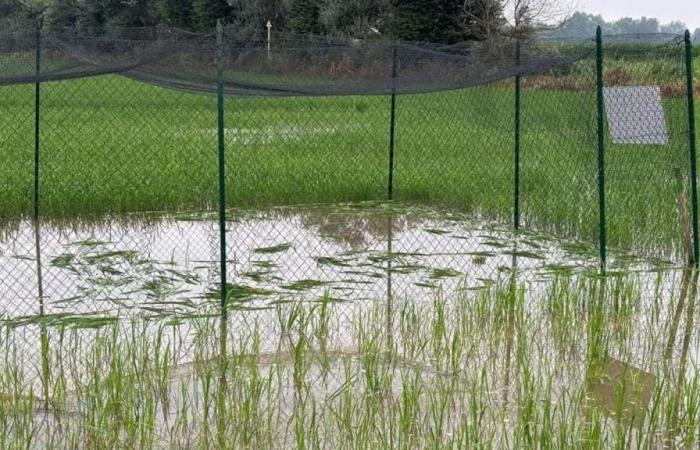
Last May 13th was a day to circle on the calendar for Italian research. One of those goals achieved that sometimes you don’t even have the courage to dream about. But it lasted very little. Because last night, the experimental rice field in the Pavia area obtained with Tea, assisted evolution techniques, was “completely destroyed by unknown persons”. Not an isolated gesture. According to the most accredited theory, they were “eco-terrorists” or “anti-GMO ideological groups”, (as claimed for example by senator for life Elena Cattaneo) who, after having tampered with the surveillance camera and torn down the protective metal mesh, had cut and uprooted the 200 seedlings of genetically edited rice (therefore which does not contain foreign genes, but only presents a “correction” which with great luck could have occurred in nature through spontaneous mutagenesis) planted in 28 square meters of land by researchers Vittoria Brambilla and Fabio Fornara of Unimi in the hope of making them more resistant to a fungal disease, Brusone.
A reckless gesture, a “cowardly act against scientific progress” says scientist Elena Cattaneo. “A real sabotage of research which confirms that in our country there are groups, minority but well organised, willing to use violent methods in order to prevent researchers from the possibility of increasing everyone’s knowledge in areas that concern our lives, the our food, our future,” he writes in a note. “In this specific case, the ecoterrorists who, protected by anonymity, acted last night know that the outcome of their actions is to defend and support the use of pesticides. In fact, they are probably unaware that the researchers’ experimental variety of rice of the University of Milan wants to reduce the use of pesticides”.
Lombardy had started the first experimentation of these techniques by the University of Milan in Mezzana Bigli, in the province of Pavia, precisely to test the response of plants to the fungus responsible for the disease: Tea, focusing on genetic improvement ( non-GMO) allow us to obtain plants that are more resistant to diseases, reducing the use of pesticides and pesticides and rationalizing the use of water. An opportunity for Italian agriculture as it prepares to face the challenges of climate change, but also pollution from herbicides and pesticides. For this reason, what is seen by all the actors in the field as an “ideological disgrace of criminals” who oppose genetic techniques and GMOs, appears even more paradoxical.
“The implementation of Vittoria Brambilla’s rice experiments – recalls the scientist – had turned into a day of celebration: Italian researchers had waited twenty years to be able to see genetically modified plants tested in the field. Also for this reason – she concludes – I trust that in addition to condemning what happened, the Government and Parliament will want to respond with concrete “equal and opposite” actions, for example by defending, promoting and stabilizing in our system the possibility of carrying out research with TEAs in the country, exceeding the time limit of 31 December 2024 of the current regulations”.
The support of the vice president of the Senate Gian Marco Centinaio, head of the Agriculture and Tourism department of the League, soon arrived: “The cowardly criminals who destroyed the rice field in the province of Pavia, where the Tea experimentation was underway, will not they delude themselves: research will not stop. The institutions, politics, universities and companies that look to the future will work together even more to guarantee Italy a cutting-edge role in the modernization of agriculture”, he says, specifying that “those who still oppose, even with these criminal methods, the experimentation of Assisted Evolution Techniques have understood nothing of the importance of this research and its safety”.
“We are not talking about an act of vandalism. It is a criminal gesture, which compromises an experiment that we were the first to manage to start in Italy” comments the regional councilor for Agriculture Alessandro Beduschi. The councilor also made it known “that the relevant reports will be presented immediately so that the incident can be clarified”. “We are witnessing – adds Maria Pia Abbracchio, vice-rector of the University of Milan with responsibility for the coordination and promotion of research – a resurgence of obscurantist and anti-scientific violence which as a State University we have no intention of tolerating”. An episode that “causes incalculable damage to the entire scientific community” concluded Abbracchio underlining that “the work of our scientists will resume and continue with even greater conviction and commitment”.
The start of the first field experimentation with genetically modified plants in Italy, in fact, was hailed as an event because until now no research group had dared to ask for authorization to experiment with the modified plants in realistic conditions (i.e. in the field). in the laboratory and grown in a greenhouse (the last application relating to a GMO dates back to 2004 and was rejected). Anna Meldolesi writes in ScienzainRete that “the European regulation on New Genomic Techniques has not yet been definitively adopted. Therefore the old rules governing the experimental releases of GMOs continue to apply even to plants that do not contain foreign genes”, as indeed the Tea, “which have three deactivated genes (Pi21, HMA1 and HMA2) thanks to the use of CRISPR genetic scissors and no transgenes”. Only “a paragraph inserted in the drought decree a year ago recognized the importance of preparing Italian agriculture for the challenge of climate change also with the help of new biotechnologies”, writes Meldolesi again, “opening a window of opportunity and unblocking the impasse of authorizations, however, submitting a notification remains a considerable undertaking, due to the amount of data to be submitted to the Ministry of the Environment and Energy Security, with the aim of demonstrating that even the most remote risks for flora, fauna, target and non-target microorganisms are virtual. reset”.





